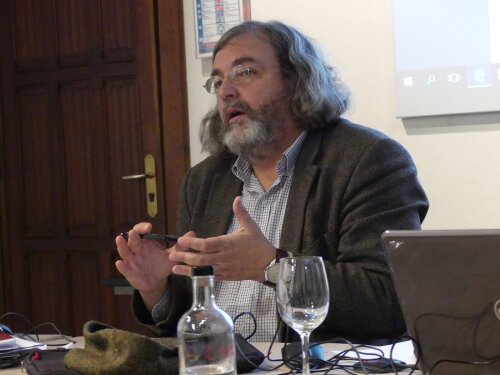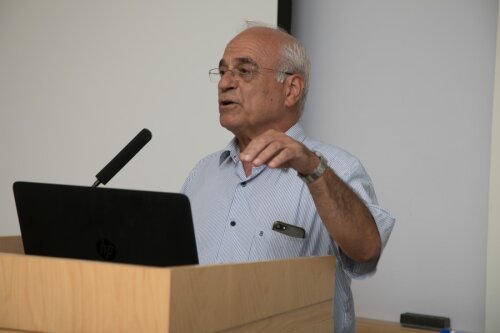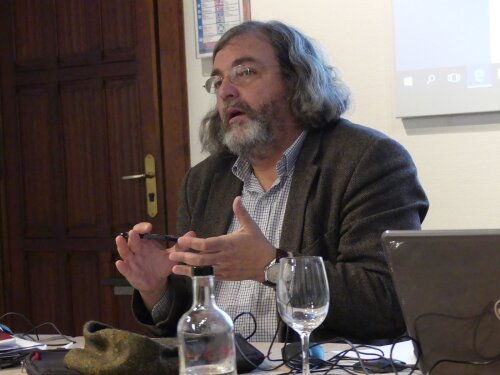UCSIA/IJS Chair 2018-2019: Prof. dr. Claude B. Stuczynski

Prof. Stuczynski is Associate Professor in the Department of General History at Bar-Ilan University and board member of the Center for the Study of Conversions and Interreligious Encounters (CSOC) at Ben-Gurion University. His two central fields of research are the Portuguese Converso phenomenon and the first encounters between Europeans and Amerindians.
Thursday 21 February 2019 at 20h
And the Rest Is History: Sabbath versus Sunday
Lecture by Prof. dr. Israel J. Yuval, Academic Head of the Jack, Joseph and Morton Mandel School for Advanced Studies in the Humanities at the Hebrew University of Jerusalem. He is the author of numerous award-winning books and received in 2016 the Bundesverdienstkreuz, awarded by the President of the Federal Republic of Germany, Mr. Joachim Gauck.
Prof. dr. Claude B. Stuczynski will act as respondent.
Tuesday 26 February 2019 at 20h
Converso Paulinism: Between ‘Marrano’ Apologetics to Judeo-Christian Theology (15th-17th Centuries)
Lecture by Prof. dr. Claude B. Stuczynski. The lecture will be followed by a reception.
Both lectures will take place at the Hof van Liere, Prinsstraat 13b, 2000 Antwerp.
Participation is free.
Registration via online registration forms, click here.
Lecture 21 February 2019
Thursday 21 February 2019 at 20h
AND THE REST IS HISTORY: SABBATH VERSUS SUNDAY
Prof. Dr. Israel J. Yuval - Hebrew University of Jerusalem
With a response by Prof. Dr. Claude B. Stuczynski (Bar-Ilan University)
Lecture in English. The lecture will take place at the Hof van Liere, Prinsstraat 13b, 2000 Antwerp.
This lecture is part of the UCSIA/IJS Chair 2018-19 and is organized in cooperation with UCSIA.
Industrialization created cultures of leisure. The pursuit of rest is part and parcel of capitalism, and it has become a universal human right. Today, we need rest not only from work but also from technology. However, the value of rest is the result of a long historical process, one in which Jews and Christians participated in antiquity and in the Middle Ages. The history of rest is restless. It contains all the components of a living culture: competition, strife, acculturation and imitation.
The question Prof. Yuval would like to address in this lecture is how the idea of rest evolved before it became common knowledge. From the beginning, Christianity set Sunday and not Saturday as the most important day of the week. Christians adopted the pagan criticism against the Jewish physical rest by defining it as “idleness”. However, in the fifth and even more so in the sixth century, the Sunday serenity became more and more justified by the biblical Sabbath model.
Parallel to the establishment of Sunday as a day of rest, there were trends to confer Christian content on Saturday. Christianity offered two alternative definitions of the concept of rest on Shabbat: the Eastern Church preferred a contemplative way and replaced rest with study; the Western Church preferred meditation, replacing rest with fasting.
Did the introduction of Sunday as an obligatory day of rest became a threat to the uniqueness of the Jewish Sabbath? Did Jews care about those internal Christian controversies? Did they formulate their own attitude toward the meaning of rest on the Sabbath?

Lecture 26 February 2019
Tuesday 26 February 2019 at 20h
CONVERSO PAULINISM: BETWEEN 'MARRANO' APOLOGETICS TO JUDAEO-CHRISTIAN THEOLOGY (15TH-17TH CENTURIES)
Prof. Dr. Claude B. Stuczynski - Bar-Ilan University
Lecture in English. The lecture will take place at the Hof van Liere, Prinsstraat 13b, 2000 Antwerp and will be followed by a reception.
This lecture is part of the UCSIA/IJS Chair 2018-19 and is organized in cooperation with UCSIA.
In this lecture, Prof. Stuczynski will argue that as a result of mass conversion in the Iberian Peninsula and the formation of a New Christian or Converso long-lasting phenomenon, some of those Spanish and Portuguese baptized Jews and their old Christian supporters employed the life and the teachings of St. Paul in order to endorse the integration of the Converso group within the Iberian society, thereby facing inquisitorial suspicion and “purity of blood” ethnic exclusion. In doing so, however, they elaborated a Judaeo-Christian way of being Catholic. Stuczynski will show how such expressions of Converso and pro-Converso Paulinism anticipated the policies of the Catholic Church vis-a-vis the Jews and Judaism, after the Shoah and the Second Vatican Council.
